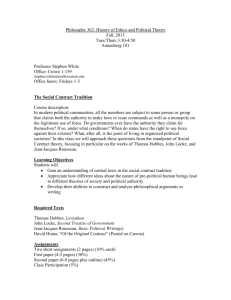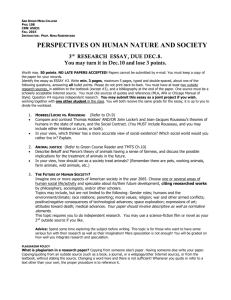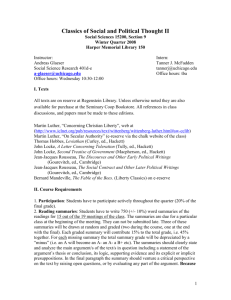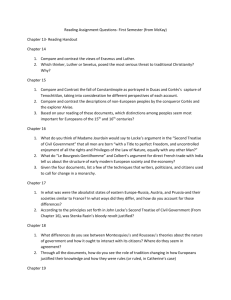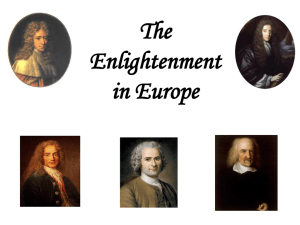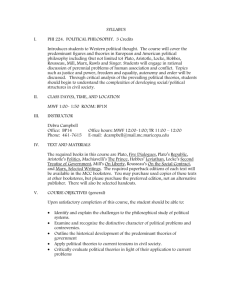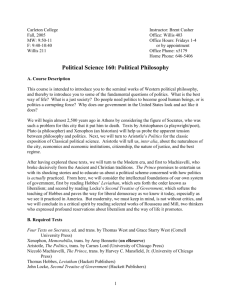1 Philosophy 355: Political Philosophy (DRAFT) UWM, fall 2014
advertisement
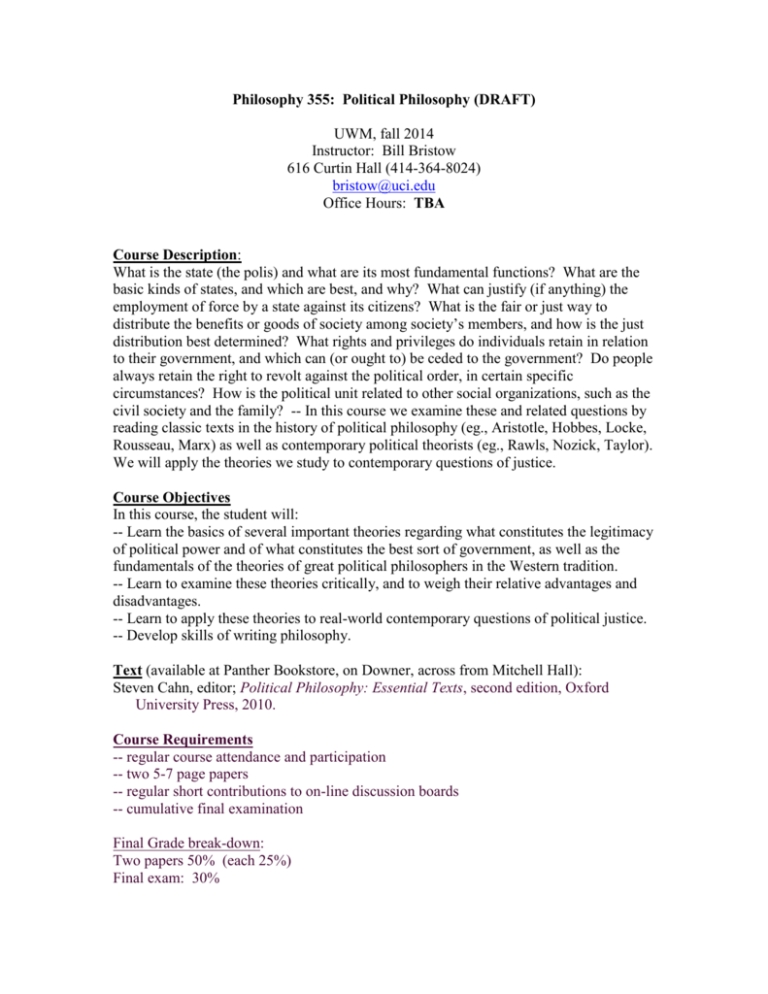
Philosophy 355: Political Philosophy (DRAFT) UWM, fall 2014 Instructor: Bill Bristow 616 Curtin Hall (414-364-8024) bristow@uci.edu Office Hours: TBA Course Description: What is the state (the polis) and what are its most fundamental functions? What are the basic kinds of states, and which are best, and why? What can justify (if anything) the employment of force by a state against its citizens? What is the fair or just way to distribute the benefits or goods of society among society’s members, and how is the just distribution best determined? What rights and privileges do individuals retain in relation to their government, and which can (or ought to) be ceded to the government? Do people always retain the right to revolt against the political order, in certain specific circumstances? How is the political unit related to other social organizations, such as the civil society and the family? -- In this course we examine these and related questions by reading classic texts in the history of political philosophy (eg., Aristotle, Hobbes, Locke, Rousseau, Marx) as well as contemporary political theorists (eg., Rawls, Nozick, Taylor). We will apply the theories we study to contemporary questions of justice. Course Objectives In this course, the student will: -- Learn the basics of several important theories regarding what constitutes the legitimacy of political power and of what constitutes the best sort of government, as well as the fundamentals of the theories of great political philosophers in the Western tradition. -- Learn to examine these theories critically, and to weigh their relative advantages and disadvantages. -- Learn to apply these theories to real-world contemporary questions of political justice. -- Develop skills of writing philosophy. Text (available at Panther Bookstore, on Downer, across from Mitchell Hall): Steven Cahn, editor; Political Philosophy: Essential Texts, second edition, Oxford University Press, 2010. Course Requirements -- regular course attendance and participation -- two 5-7 page papers -- regular short contributions to on-line discussion boards -- cumulative final examination Final Grade break-down: Two papers 50% (each 25%) Final exam: 30% 2 On-line short writing 10% Participation 10% Course Procedures: -- If you will need accommodations in order to meet any of the requirements of this course because of a disability, please contact me as soon as possible. If you have not already done so, you should also contact the Student Accessibility Center at 229-6287. -- If religious observances in your faith conflict with some of the requirements of this course, please speak to me as soon as possible regarding making accommodations. -- Various university policies regarding students’ participation in courses can be accessed via the following URL: http://www.uwm.edu/Dept/SecU/SyllabusLinks.pdf -- Cheating on exams and plagiarism on written assignments are violations of the academic honor code and carry severe sanctions, including failing a course or even suspension or dismissal from the university. Learn what constitutes academic misconduct, according to the policy of the university, by consulting the following website: http://www.uwm.edu/Dept/OSL/DOS/conduct.html Class schedule (tentative): (All page numbers reference Cahn, Political Philosophy: The Essential Texts.) I. Raising fundamental questions: Aristotle’s Politics First meeting: Meeting 1: Introduction to the course. Kraut, pp.. 150-153 Aristotle, Politics, Book One. (pp. 175-181). Meeting 2: Aristotle, Politics, Book Two, and Book Three, chs. 1-6 (pp. 181195). Aristotle, Politics, Book Three, chs. 7-12 (pp.195-202). Meeting 3: II. Modern social contract theory: Hobbes and Locke Meeting 1: Meeting 2 : Hampton, pp. 282-284. Hobbes, Leviathan, Intro and Part One, up through ch. 11 (pp. 285290) Hobbes, Leviathan, Part One, chs. 12-13 (pp. 290-294). Meeting 3: Meeting 4: Hobbes, Leviathan, Part One, chs 14-15 (pp. 294-299). Hobbes, Leviathan, Part Two, chs. 17-18 (pp. 299-304). Meeting 5: Meeting 6: Hobbes, Leviathan, Part Two, chs. 21, 29 (pp. 305-310). A. John Simmons, pp. 311-315. Locke, Second Treatise, chapters I and II (pp. 315-318). Meeting 7: Meeting 8: Locke, Second Treatise, chs. III-V, VII (pp. 318-325) Locke, Second Treatise, chs. VIII-XI (pp. 325-332). 3 Meeting 9: Meeting 10: Locke, Second Treatise, chs. XII-XIII, XVI-XVIII (pp. 332-339). Locke, Second Treatise, ch. XIX (pp. 339-342). First paper due in class. III. Human Liberation through re-organization of political society: Rousseau’s Communitarianism and Marx’s Communism Meeting 1: Meeting 2: Cohen, pp. 351-354 Rousseau, “Discourse on Origin of Inequality”, (pp. 355-370) Rousseau, Social Contract, Book One (pp. 370-376). Meeting 3: Meeting 4: Rousseau, Social Contract, Book Two (pp.376-382) Rousseau, Social Contract, Book Three (pp. 382-391) Meeting 5: Meeting 6: Rousseau, Social Contract, Book Four (pp. 391-398). Miller, pp. 566-569 Marx, “Estranged Labor”, (pp. 569-576) Meeting 7: Meeting 8: Marx, “The German Ideology”, (pp. 577-582). Marx, “Communist Manifesto” (pp. 583-594). IV. Contemporary Liberalism and Some Critics Meeting 1: Cohen, pp. 690-694. Rawls, Theory of Justice, §§3-4 (pp. 694-699). Meeting 2: Meeting 3: Rawls, Theory of Justice, §§4, 11, 13, 17 (pp. 699-704). Rawls, Theory of Justice, §§24-26 (pp. 704-709). Meeting 4: Christiano, pp. 710-713. Nozick, Anarchy, Chapter 7, (pp. 713-725). Talisse, pp. 726-728. Charles Taylor, “Atomism”, (pp. 729-743). Second paper due in class. Meeting 5: Meeting 6: Final Examination: Cheshire Calhoun, pp. 778-781 Held, Non-contractual society, (pp. 782-795).
